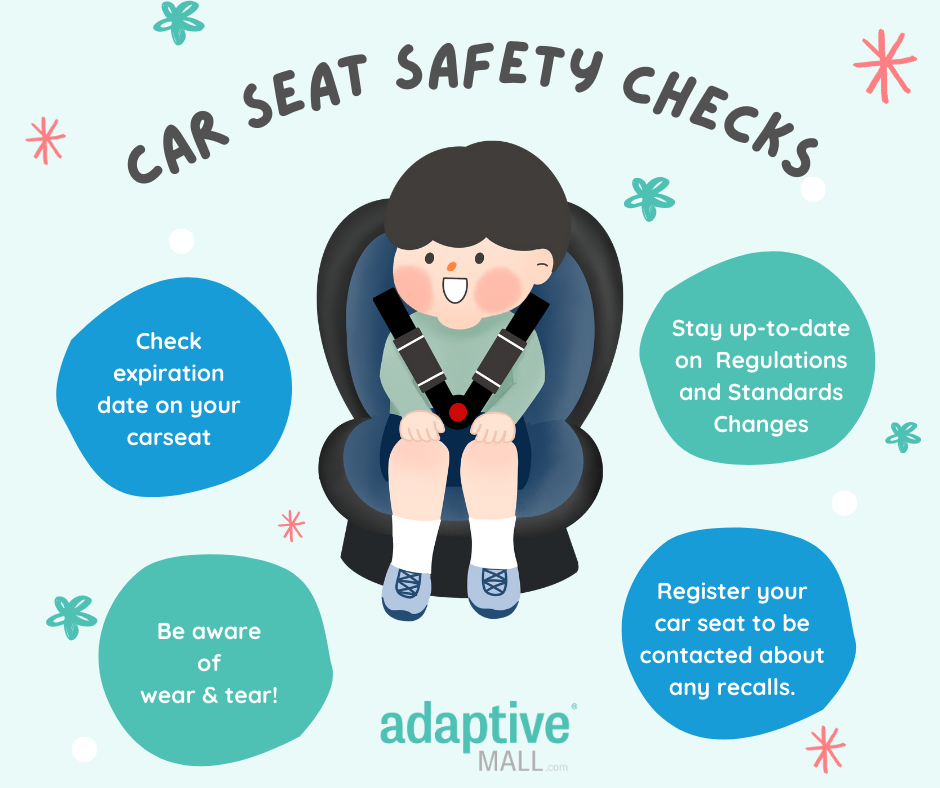Did You Know? Car Seats Have an Expiration Date. (And Here’s Why!)
Being aware of your Car Seat or Booster Seat's Expiration Date is an important part of complying with safety regulations and standards that protect your child.
Car Seats have an expiration date?! Yes! You may be thinking “Is this just another way for companies to get me to spend more of my hard earned dollars?" Let’s take a closer look at why expiration dates are so important to safety.
According to the National Center on Early Childhood Health and Wellness, all car seats have expirations dates. The life span of a car seat varies by manufacturer and ranges from 6 to 10 years. Expiration dates can be found on a label embedded in the shell of the seat or in the owner’s manual for the car seat.


According to a recent article published by healthline.com, there are three primary reasons why car seats expire.
Wear and Tear: An expiration date ensures that if all signs of wear and tear are ignored by the owner, the car seat will still be disposed of in a timely fashion. If we sat down and calculated the average number of times a child will be buckled into their car seat during the first 5 years of their life, I think we would all be surprised. Any piece of equipment that is used frequently is subject to normal wear and tear but especially when its primary purpose is to restrain the forces of a little person. Typical use of a car seat could subject it to spills and messes, attempts at rocking and escaping, expressions of joy or frustration through kicking and banging and even the gnawing of straps by tiny teeth. It all adds up. You also might live in an area where the car seat is exposed to extreme temperatures. A car with car seat parked baking in the sun on a hot summer day might be the same car with car seat that sits is the parking lot at a ski resort all weekend long enduring sub-zero temperatures. Over time, micro fissures (small cracks) in the molded plastic shell are possible which can weaken the material’s resilience to impact. Lost and broken parts are another thing that can accumulate as the years go by. Nothing lasts forever and your child’s car seat is no exception to that rule.
Changing Regulations and Standards: An expiration date ensures that if the owner of a car seat fails to keep up with changes in regulations and standards, use of the car seat will still be discontinued at the end of its lifespan. The United States Department of Transportation and all major manufacturers of car seats along with other professional organizations such as the American Academy of Pediatrics are constantly assessing and reassessing children’s safety in car seats because unfortunately, motor vehicle accidents are the leading cause of death in children in the US. As information is collected, our understanding evolves and technology advances, the ability to ensure your child’s safety in a moving vehicle improves. This results in changes to regulations and standards.
Limitations of Manufacturer Testing: An expiration date ensures that a car seat will not be used beyond the time frame established as safe by manufacturer testing.
Manufacturers assume a limited lifespan of a car seat and car seats are constructed for durability based on these assumptions. Car seats are not generally tested beyond 10 years of age. If use of a car seat extends beyond that time frame there is no information available on its safety
Expiration dates are not the only thing to keep in mind as car seats get older.
Recalls: When purchasing a car seat, it is a very good idea to send in the registration card that is attached to the car seat. This will allow the manufacturer to contact you directly if the car seat is recalled for any reason. You can also contact the car seat manufacturer directly to find out how to register your seat. If you prefer you can go to the National Highway Traffic Safety Administration (NHTSA) site Recalls page and click on car seats. You will be asked to enter the brand name or model of your car seat and you will be given information regarding safety issues and recalls.
Car Seats that have Been Involved in an Accident: Car seats are meant to protect your child during one crash. The NHTSA recommends that car seats be replaced following a moderate or severe crash in order to ensure a continued high level of crash protection for child passengers. Car Seats do not automatically need to be replaced following a minor crash which is defined as ALL the following:
- The vehicle was able to be driven away from the crash site.
- The vehicle door nearest the car seat was not damaged.
- None of the passengers in the vehicle sustained any injuries in the crash.
- If the vehicle has air bags, the air bags did not deploy during the crash; and
- There is no visible damage to the car seat
The history of a Car Seat may be difficult to establish accurately if it is a hand-me-down or if it is borrowed. It is usually best practice to not use a car seat with an unknown history. However, Certified Child Passenger Safety Technicians are available in any situation to help you determine if a car seat is safe for your child. You can find a technician by going to safekids.org and click on Find a Tech.
Car seat expiration dates are part of important safety regulations that help protect your child. Checking these important dates and staying current on safety standards can keep your child safe and give you peace of mind.

